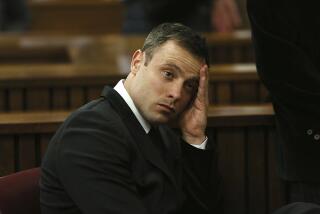S. African Cites Efforts to Free Mandela
JOHANNESBURG, South Africa â Foreign Minister Roelof F. (Pik) Botha, returning from talks with top American officials in Vienna on the civil unrest here, said Saturday that the South African government wants to free Nelson Mandela, the imprisoned patriarch of the African National Congress, but has so far been unable to reach agreement on terms for his release.
âThere are members of the South African government who believe he has been in jail for many years and ought to be set free,â Botha said of Mandela, who was originally jailed in 1961 and is serving a life sentence for sabotage and other offenses. âThe question now is how.â
The government tried twice to parole Mandela in the custody of his cousin, Chief Kaizer Mantanzima, president of the nominally independent Xhosa tribal homeland of Transkei, who is acceptable to the white authorities in Pretoria but is disdained as a collaborator by many South African blacks. Then in February, Pretoria publicly offered to free Mandela if he would renounce violence in the struggle against apartheid.
Unconditional Freedom
But Mandela, 67, has refused to accept any conditions for his release, declaring that âonly free men can negotiate,â and this has denied the National Party administration the political gains it had sought by freeing the man who has become a symbol of the drive against South Africaâs policy of racial segregation.
Secret talks are again under way, however, on new terms for Mandelaâs release, according to sources close to the Mandela family and elsewhere in the black community, and consultations have begun between Mandela, his wife, Winnie, and his advisers here, and the leaders abroad of the outlawed African National Congress through their lawyers in South Africa.
Questioned about widespread reports here that he had informed U.S., British and West German officials that Mandela would be freed shortly as part of an effort by the government to end a year of civil unrest, Botha said: âWe certainly discussed the subject of Mr. Mandela, but I certainly did not inform them that he would be released--as they put it--unconditionally.â
Releasing an Enemy?
The governmentâs dilemma, the foreign minister continued, is whether an unconditional release of the revered nationalist figure would be tantamount to allowing him to resume the planning of guerrilla attacks, a charge on which he was convicted.
Officials still feel, Botha indicated, that a commitment to nonviolence should be a condition of release, but he indicated that a way might be found for Mandela to meet that condition without formally denouncing the African National Congress and its military wing, Umkhonto we Sizwe (Spear of the People) for their guerrilla campaign over the years.
Botha said that in Vienna he briefed Robert C. McFarlane, President Reaganâs national security adviser, and Chester A. Crocker, assistant secretary of state for African affairs, on his countryâs plans for political, economic and social reforms, many of which are expected to be announced Thursday by President Pieter W. Botha.
In another development Saturday, Rep. Stephen J. Solarz (D-N.Y.), who met with Foreign Minister Botha last week and will see President Botha in Pretoria on Monday, said he believes that the South African government is giving âvery serious consideration to a statement of intent that would incorporate a declaration of principles concerning the future of South Africa, that would in a number of respects constitute a significant departure from the apartheid system and the present policies.â
Blueprint for Talks
Without going into details, Solarz said he foresees the declaration as a general blueprint for the countryâs future and a move toward meeting the demand by most black leaders for a start toward true black-white negotiations.
Foreign Minister Botha announced that South Africaâs ambassador-designate, Herbert Beukes, will return to Washington after being recalled 10 days ago in anger over the United Statesâ two-month delay in accepting his credentials and the tentative approval in Congress of economic sanctions.
But a return to South Africa of U.S. Ambassador Herman W. Nickel, recalled in June to protest South African raids on neighboring Botswana and Angola, is understood to have been delayed while Washington studies the reforms expected to be unveiled this week.
More to Read
Sign up for Essential California
The most important California stories and recommendations in your inbox every morning.
You may occasionally receive promotional content from the Los Angeles Times.








